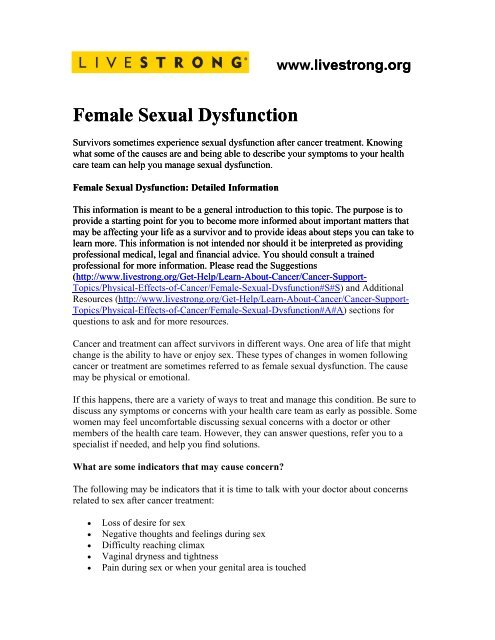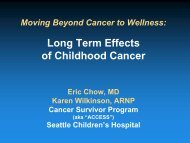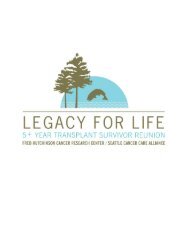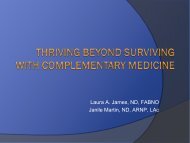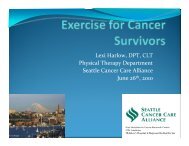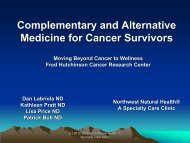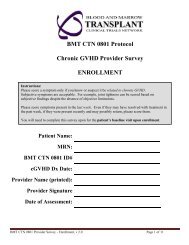Female Sexual Dysfunction
Female Sexual Dysfunction
Female Sexual Dysfunction
Create successful ePaper yourself
Turn your PDF publications into a flip-book with our unique Google optimized e-Paper software.
<strong>Female</strong> <strong>Sexual</strong> <strong>Dysfunction</strong><br />
www.livestrong.org<br />
.livestrong.org<br />
Survivors sometimes experience sexual dysfunction after cancer treatment. Knowing<br />
what some of the causes are and being able to describe your symptoms to your health<br />
care team can help you manage sexual dysfunction.<br />
<strong>Female</strong> <strong>Sexual</strong> <strong>Dysfunction</strong>: Detailed Information<br />
This information is meant to be a general introduction to this topic. The purpose is to<br />
provide a starting point for you to become more informed about important matters that<br />
may be affecting your life as a survivor and to provide ideas about steps you can take to<br />
learn more. This information is not intended nor should it be interpreted as providing<br />
professional medical, legal and financial advice. You should consult a trained<br />
professional for more information. Please read the Suggestions<br />
(http://www.livestrong.org/Get-Help/Learn-About-Cancer/Cancer-Support-<br />
Topics/Physical-Effects-of-Cancer/<strong>Female</strong>-<strong>Sexual</strong>-<strong>Dysfunction</strong>#S#S) and Additional<br />
Resources (http://www.livestrong.org/Get-Help/Learn-About-Cancer/Cancer-Support-<br />
Topics/Physical-Effects-of-Cancer/<strong>Female</strong>-<strong>Sexual</strong>-<strong>Dysfunction</strong>#A#A) sections for<br />
questions to ask and for more resources.<br />
Cancer and treatment can affect survivors in different ways. One area of life that might<br />
change is the ability to have or enjoy sex. These types of changes in women following<br />
cancer or treatment are sometimes referred to as female sexual dysfunction. The cause<br />
may be physical or emotional.<br />
If this happens, there are a variety of ways to treat and manage this condition. Be sure to<br />
discuss any symptoms or concerns with your health care team as early as possible. Some<br />
women may feel uncomfortable discussing sexual concerns with a doctor or other<br />
members of the health care team. However, they can answer questions, refer you to a<br />
specialist if needed, and help you find solutions.<br />
What are some indicators that may cause concern?<br />
The following may be indicators that it is time to talk with your doctor about concerns<br />
related to sex after cancer treatment:<br />
Loss of desire for sex<br />
Negative thoughts and feelings during sex<br />
Difficulty reaching climax<br />
Vaginal dryness and tightness<br />
Pain during sex or when your genital area is touched
These types of symptoms are not generally considered to be medical emergencies. For<br />
this reason, you may wonder if you should bring up the subject to a member of your<br />
health care team. Keep in mind that all of your physical and emotional concerns are<br />
important. This is especially true if you are experiencing pain during sex or feeling that<br />
your intimate relationship has become less enjoyable.<br />
Prepare in advance to talk with your doctor. Write down any questions and concerns you<br />
have about your sexual health. You may need to request extra time for your appointment<br />
to allow enough time for a discussion. If your doctor cannot help you, ask for a referral to<br />
another health care professional who specializes in this area.<br />
Will all female cancer survivors experience sexual problems?<br />
Not all survivors will experience sexual problems. In some cases, a woman may choose<br />
to wait a while after treatment before having sex. Another woman may be in a situation<br />
where she is ready to resume sexual relations right away. In any case, there may be things<br />
that can help you prepare emotionally as well as make the sexual experience more<br />
physically comfortable.<br />
If a sexual concern is likely to occur, it may be during and after cancer treatment. Be<br />
certain to discuss any problems and symptoms with your doctor—especially if you begin<br />
to notice any changes in your ability to have or enjoy sex. Some problems, such as those<br />
caused by radiation to the pelvis, may develop months or even years after cancer<br />
treatment is done.<br />
What causes sexual functioning concerns after cancer?<br />
There are many different causes of sexual functioning concerns in female cancer<br />
survivors. Some are physical causes. Others may be due to changes in how you feel about<br />
yourself, your body, or other aspects of your life after cancer.<br />
Certain types of cancer, such as those that affect sexual organs, can put survivors at risk<br />
for problems. Approximately half of survivors of breast cancer and other cancers that<br />
affect the pelvic area (such as the cervix, ovaries, uterus, bladder, colon or vagina)<br />
develop long-term sexual problems. Yet, most problems are actually caused by treatment<br />
and not the cancer itself.<br />
Some ways treatment can affect sexual functioning include:<br />
Chemotherapy can damage the ovaries, causing hormonal changes and<br />
temporary or permanent menopause in younger women.<br />
Radiation can affect the vagina, cervix, or uterus.<br />
Surgery or radiation therapy can affect cancers in the pelvic area (bladder,<br />
colorectal, cervical, ovarian, uterine, vaginal, or vulvar cancer).<br />
Side effects of medicines used to treat pain, nausea, depression, or anxiety can<br />
affect sexual functioning.
If possible, talk with your health care team about the risks for problems with sexual<br />
functioning before you begin cancer treatment. There may be things that can be done to<br />
minimize risks. If you have already undergone treatment, talk with your doctor about<br />
finding ways to treat symptoms or concerns now.<br />
Certain emotions can also contribute to intimacy challenges such as:<br />
Sad or depressed feelings<br />
Concerns about being less attractive<br />
Stress in the relationship with your partner<br />
Difficulty with self-esteem because of physical changes<br />
If physical changes affect how a woman feels about herself or her body, this can also<br />
contribute to sexual problems. For example, it may be more challenging for someone<br />
who was uncomfortable with sexuality or had tension in a relationship before cancer. If<br />
you have these types of concerns, ask your doctor for a referral to a licensed counselor<br />
who has experience working with cancer survivors.<br />
Are there successful treatments for women with sexual concerns?<br />
There are a number of treatment options that can help women with sexual functioning<br />
concerns. It is important to discuss problems and concerns with your doctor as early as<br />
possible.<br />
Your health care team can help you learn more about how to treat concerns and improve<br />
your ability to enjoy sex again. There are many ways to enhance and share pleasure and<br />
closeness with your partner. Even survivors who no longer have sex are able to find ways<br />
to continue to enjoy deep intimacy with their partners.<br />
Of course, the most important factor in choosing a cancer treatment is its ability to<br />
control cancer. However, your sexual health is also important. If you are worried about<br />
sexual dysfunction after cancer treatment, talk with your health care team soon as you<br />
can about the different therapies that may be available to help you.<br />
This document was produced in collaboration with:<br />
Leslie R. Schover, Ph.D.<br />
Professor of Behavioral Science, UT M. D. Anderson Cancer Center<br />
Works Cited<br />
American Cancer Society. “<strong>Sexual</strong>ity and Cancer: For the Woman with Cancer and Her Partner.”<br />
Atlanta: American Cancer Society, 2001 (99-rev. 07/01-50M-no. 4657-HCP).<br />
Andersen, Barbara L. “Surviving cancer: The Importance of <strong>Sexual</strong> Self-Concept.” Medical and<br />
Pediatric Oncology 33 (1999): 15-23.<br />
Ganz, Patricia, Julia A. Rowland, Katherine Desmond, et al. “Life after breast cancer:<br />
Understanding women’s health-related quality of life and sexual functioning.” Journal of Clinical<br />
Oncology 16 (1998): 501-14.
Grumann, Mareile, Robert Robertson, Neville F. Hacker, and Greta Sommer. “<strong>Sexual</strong><br />
Functioning in Patients following Radical Hysterectomy for Stage IB Cancer of the Cervix.”<br />
International Journal of Gynecologic Cancer 11 (2001): 372-80.<br />
Jensen Pernille T., Mogens Groenvold, Marianne C. Klee, et al. “Longitudinal Study of <strong>Sexual</strong><br />
Function and Vaginal Changes after Radiotherapy for Cervical Cancer.” International Journal of<br />
Radiation Oncology, Biology, and Physics 56 (2003): 937-49.<br />
National Ovarian Cancer Coalition. Ovarian Cancer: <strong>Sexual</strong>ity and Intimacy. Boca Raton, FL:<br />
2003.<br />
Schover, Leslie. <strong>Sexual</strong>ity and Fertility after Cancer. New York: John Wiley & Sons, 1997.<br />
<strong>Female</strong> <strong>Sexual</strong> <strong>Dysfunction</strong>: Suggestions<br />
The suggestions that follow are based on the information presented in the Detailed<br />
Information (http://www.livestrong.org/Get-Help/Learn-About-Cancer/Cancer-Support-<br />
Topics/Physical-Effects-of-Cancer/<strong>Female</strong>-<strong>Sexual</strong>-<strong>Dysfunction</strong>#D#D) document. They<br />
are meant to help you take what you learn and apply the information to your own needs.<br />
This information is not intended nor should it be interpreted as providing professional<br />
medical, legal and financial advice. You should consult a trained professional for more<br />
information. Please read the Additional Resources (http://www.livestrong.org/Get-<br />
Help/Learn-About-Cancer/Cancer-Support-Topics/Physical-Effects-of-Cancer/<strong>Female</strong>-<br />
<strong>Sexual</strong>-<strong>Dysfunction</strong>#A#A) section for links to more resources.<br />
<strong>Sexual</strong> Functioning Concerns How to Find Help<br />
Loss of desire for sex after cancer Ask a member of your health care<br />
team to check your medications for<br />
possible side effects.<br />
Get medical treatment for pain that<br />
will not go away or fatigue that may<br />
be affecting your energy and desire<br />
for sex.<br />
If you are in menopause, see a<br />
gynecologist or an endocrinologist<br />
for a blood test to find out if your<br />
testosterone is low. Women need<br />
some testosterone for good sexual<br />
function. However, if you had breast<br />
cancer, using replacement<br />
testosterone may not be safe for you.<br />
Discuss other options with your<br />
health care team.<br />
If there are no physical causes, see a<br />
licensed counselor to find out if<br />
problems could be related to feelings<br />
of depression, anxiety or low selfesteem.
<strong>Sexual</strong> Functioning Concerns How to Find Help<br />
Difficulty feeling pleasure during sex Loss of interest in sex may be related<br />
to how you feel about yourself.<br />
Ask for a referral to a therapist who<br />
specializes in treating cancer<br />
survivors.<br />
Vaginal dryness and tightness, making<br />
sexual activity uncomfortable or painful<br />
Talk with a gynecologist who has<br />
expertise in menopause and<br />
problems with pain during<br />
intercourse.<br />
Ask your gynecologist, for advice on<br />
muscle relaxation, local forms of<br />
estrogen, or over-the-counter<br />
lubricants.<br />
Difficulty reaching orgasm Ask your health care team to check<br />
your medications. Antidepressants or<br />
anti-anxiety medicines may make it<br />
more difficult for you to have an<br />
orgasm.<br />
Give yourself time. Try not to<br />
pressure yourself to have an orgasm.<br />
Sometimes this makes it hard for you<br />
to relax.<br />
The nerves that help a woman feel<br />
pleasure around the clitoris and in<br />
the vagina are rarely damaged by<br />
cancer treatment. This means the<br />
cancer or its treatment may not<br />
physically prevent you from having<br />
an orgasm.<br />
Talk with your doctor about treatment options for sexual concerns. The following table<br />
cites common methods that may be recommended, as well as some pros and cons for<br />
using them:<br />
Treatment options for<br />
some types of sexual<br />
dysfunction<br />
Pills<br />
(PDE-5 inhibitors)<br />
Pros Cons<br />
Increases vaginal<br />
lubrication without using<br />
estrogen hormones.<br />
Studies of PDE-5<br />
inhibitors in women<br />
do not show a lot of<br />
change in female<br />
sexual functioning.
Treatment options for<br />
some types of sexual<br />
dysfunction<br />
Pros Cons<br />
Water-based lubricants Water-based lubricants<br />
last longer and work<br />
better than old-style gels.<br />
Can be purchased at most<br />
drugstores or over the<br />
Internet.<br />
Vaginal moisturizers<br />
(such as Replens)<br />
Vaginal estrogen<br />
replacement (such as<br />
Estring, Vagifem)<br />
Find comfortable<br />
positions for intercourse<br />
Learn to relax muscles<br />
around the vaginal<br />
entrance<br />
This gel keeps the vaginal<br />
lining moist all the time.<br />
Needs to be used<br />
regularly at bedtime for<br />
up to two months to reach<br />
its full effect.<br />
May replace the need for<br />
water-based lubricants.<br />
Some women prefer these<br />
products to vaginal<br />
estrogen cream.<br />
The Estring releases a<br />
small dose of hormone<br />
over three months.<br />
The Vagifem suppository<br />
is used a couple of times a<br />
week.<br />
Both Estring and Vagifem<br />
produce a low dose of<br />
estrogen. This is<br />
considered to be helpful<br />
treating vaginal dryness<br />
with very little hormone<br />
released into the<br />
bloodstream. Generally<br />
thought to be safer than<br />
pills, patches, or creams.<br />
Certain positions may<br />
help avoid pain during<br />
sex.<br />
Learn methods of<br />
relaxation to avoid pain<br />
The lubrication may<br />
wear off and need to<br />
be re-applied during<br />
intercourse.<br />
May not be effective<br />
enough to avoid pain<br />
if there is severe<br />
vaginal dryness.<br />
Can be costly and is<br />
not covered by<br />
insurance.<br />
May be somewhat<br />
messy.<br />
Some oncologists still<br />
worry about breast<br />
cancer survivors<br />
using these products.<br />
Requires good<br />
communication<br />
between partners.<br />
Can help minimize<br />
pain, but may not<br />
relieve pain if
Treatment options for<br />
some types of sexual<br />
dysfunction<br />
Herbs and lotions Lotions may act as<br />
lubricants.<br />
Clitoral pump (such as<br />
Eros)<br />
Pros Cons<br />
during intercourse. scarring exists.<br />
A small pump used to<br />
draw blood into the<br />
clitoris to increase sexual<br />
arousal.<br />
<strong>Female</strong> <strong>Sexual</strong> <strong>Dysfunction</strong>: Additional Resources<br />
LIVESTRONG Care Plan<br />
www.livestrongcareplan.org<br />
No studies have<br />
shown lotions to help<br />
with sexual<br />
dysfunction.<br />
Some lotions may be<br />
irritating to the skin<br />
or tissues.<br />
Herbal remedies may<br />
interfere with other<br />
medicines or may<br />
have unknown<br />
dangers.<br />
No scientific evidence<br />
that it works.<br />
Costly and not<br />
covered by insurance.<br />
Gives sensation<br />
similar to a vibrator.<br />
This free online tool was created to help you develop a personalized plan for posttreatment<br />
care. It can help you work with your oncologist and primary health care<br />
provider to address medical, emotional and social challenges that may arise after cancer<br />
treatment is completed. By answering some questions related to your cancer treatment,<br />
you will receive information about your follow-up care. This information includes<br />
symptoms to watch for in the future and steps you can take to stay healthy.<br />
LIVESTRONG Navigation Services<br />
LIVESTRONG.org/Get-Help<br />
Online: Complete an intake form through the LIVESTRONG website.<br />
Phone: 1.855.220.7777 (English and Spanish)<br />
Navigators are available for calls Monday through Friday, 9 a.m. to 5 p.m. (Central<br />
Time). Voicemail is available after hours.
LIVESTRONG offers assistance to anyone affected by cancer, including the person<br />
diagnosed, loved ones, caregivers and friends. The program provides information about<br />
fertility risks and preservation options, treatment choices, health literacy and matching to<br />
clinical trials. Emotional support services, peer-to-peer matching and assistance with<br />
financial, employment and insurance issues are also available. To provide these services,<br />
LIVESTRONG has partnered with several organizations including Imerman Angels,<br />
Navigate Cancer Foundation, Patient Advocate Foundation and EmergingMed.<br />
American Cancer Society (ACS)<br />
www.cancer.org<br />
The American Cancer Society (ACS) offers information about many of the challenges of<br />
cancer and survivorship. You can search for information by cancer type or by topic. ACS<br />
provides a list of support groups in your area. You can join online groups and message<br />
boards. Some information on the website is available in Spanish, Chinese, Korean and<br />
Vietnamese. ACS specialists can answer questions 24 hours a day by phone or email.<br />
U.S. Institutes of Health - National Cancer Institute (NCI)<br />
www.cancer.gov<br />
The National Cancer Institute’s website provides accurate information about the<br />
challenges cancer can bring. You can search for information by cancer type or topic. You<br />
can find information about treatment, financial and insurance matters. You can also learn<br />
how treatments in development work and search for a clinical trial in your area. This site<br />
also has a good dictionary of cancer terms, drug information and other publications.<br />
Cancer information specialists can answer your questions about cancer and help you with<br />
quitting smoking. They can also help you with using this Web site and can tell you about<br />
NCI's printed and electronic materials. The knowledgeable and caring specialists have<br />
access to comprehensive, accurate information on a range of cancer topics, including the<br />
most recent advances in cancer treatment. The service is confidential, and information<br />
specialists spend as much time as needed for thorough and personalized responses.<br />
Reprinted with permission by LIVESTRONG, 2011. All rights reserved. LIVESTRONG<br />
is a registered trademark of the Lance Armstrong Foundation. www.LIVESTRONG.org<br />
offers free online information, tools, and support services for people affected by cancer<br />
and for professionals who provide cancer support


